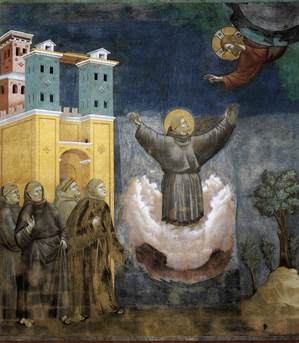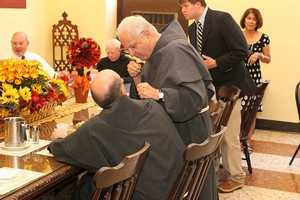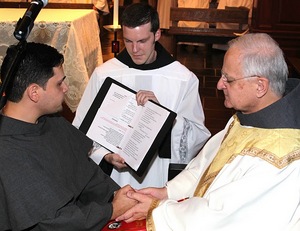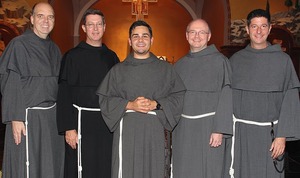Over the weekend I had the pleasure of attending a friend’s profession of first vows as a Conventual Franciscan friar. Friar Gabriel Mary Scasino is a member of the Immaculate Conception Province of Conventuals. The vow ceremony was held at the National Shrine of St Anthony of Padua, Ellicott City, MD, on the Solemnity of St Joseph of Cupertino (the day was a solemnity because the friary is dedicated to the honor of Cupertino).
Friar Gabriel is one of two men who Franciscan Conventuals from New Haven, CT. There is 1 Capuchin also from New Haven.
You may ask what is a “Conventual Franciscan”? Some may hear the terms “black Franciscans” or “Grey Friars” or even “community of Franciscans”. All are synonyms. The friars are called “black” or “grey” Franciscans due to the color of the habit worn.
The friars themselves define themselves in their Constitutions as “… a community founded by St. Francis of Assisi under the name of Friars Minor. From its earliest times the word conventual was added to this name. The members of the Order are called Friars minor Conventual. From its found our community by the will of our Father St. Francis, is a true fraternity. Its members, therefore, as brothers of a single family, share in the life and work of the community ….”
Further it is stated that “St. Francis wanted his brothers to be known as Friars Minor ‘so that…from the very name itself his disciples might realize that they had come to the school of the humble Christ to learn humility.” Plus it is said that the “friars are united in a conventual fraternity, in the proper sense of that term, so as to foster greater dedication, a more regular life, a more fervent divine office, a better formation of candidates, the study of theology, and the other works of the apostolate in the service of the Church of God so that, especially under the guidance of Mary Immaculate, the Kingdom of Christ may be extended throughout the world.”
So, Gabriel become a member of the venerable order founded by the saint himself. But what does “profession of vows” mean? According to the Constitutions, one’s profession of vows means that friars:
- “dedicate themselves directly and entirely to God in a special manner;
- are conformed more exactly to the type of life Christ the Lord chose for Himself and are united in a special way to the Church and her saving mission;
- stimulate the fervor of their charity through a fuller expression of their baptismal consecration, progress in the life of pilgrims and penitents, and voluntarily deny themselves goods and otherwise highly esteemed.”
Also, it is taught that “By their very nature the three vows bind under pain of serious sin.” Everything we do has some type of implication.
Folding his hands between those of the Father Minister Provincial Justin Biase, and resting them on the Evangeliary, Friar Gabriel said:
To the praise and glory of the Most Holy Trinity! I, friar Gabriel Mary Scasino inspired by divine grace to follow the Gospel more closely in the footsteps of our Lord, Jesus Christ, with firm faith and will, in the presence of my brothers, into your hands friar Justin, vow to God, the holy and omnipotent Father, to live for three years of my life in obedience, without anything of my own, and in chastity, and I also promise to observe faithfully the life and Rule of the Friars Minor confirmed by Pope Honorius, according to the Constitutions of the Order of Friars Minor Conventual. Therefore, I commit myself to this fraternity with my whole heart, so that, by the working of the Holy Spirit, the example of Mary Immaculate, the intercession of our Father Francis and all the saints, with the help of brothers in the service of God, the Church and humanity, I may attain perfect charity. (Vow formula, OFM Conventual)
One striking promise made to Gabriel by the Provincial upon receiving the vows is that “if you [Gabriel Mary] observe them [the vows], I promise you life everlasting.” The certainty is what impressed me; the certainty that the Franciscan way of life, if observed, leads one to the personal encounter with God. Very few instances in the Christian life, in addition to Baptism and the holy Eucharist, can make this assertion with faithfulness and Truth.



